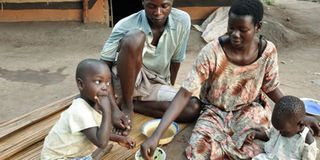Reduce rising level of poverty in Uganda

Meal time at a Ugandan home. Poverty levels still worrying. WORLD VISION PHOTO
What you need to know:
The issue: Poverty
Our view: Ugandans need more and better job opportunities. As the economy struggles to recover from the Covid-19 effects, we are reminded that government’s recent promise of Shs4.7 trillion stimulus package is taking longer than expected to trickle down to the ordinary Ugandan.
Uganda’s poverty levels have risen again. A Finance ministry report has shown that poverty has risen by 10 per centage points. The report notes that before theCovid-19 pandemic, poverty stood at 18 per cent but it has now risen to 28 per cent. This increase could reverse the gains made in bringing down poverty levels in a decade.
The Ministry of Finance also notes that 65 per cent of Ugandans lost income due to the pandemic. A UN report shows that about three million Ugandans have slipped back into poverty as a result of the Covid-19 pandemic. The sad news is that it will take years for them to emerge out of it.
The scope of poverty has affected eastern Uganda most. Eastern region now has a higher poverty rate and a higher population in poverty than northern Uganda.
The likelihood of becoming poor is higher in eastern Uganda where the poverty rate is projected to rise from 28.8 per cent to 53.3 per cent, northern region will grow from 30.3 per cent to 44.8 per cent, western region will experience a rise from 13.2 per cent to 31.7 per cent while the central region will experience a rise from 8.9 per cent to 18.8 per cent, according to the report.
It is no wonder that the World Bank now predicts that the Covid-19 pandemic will push an additional 88 million to 115 million people into extreme poverty this year, with the total rising to as many as 150 million by 2021, depending on the severity of the economic contraction. Extreme poverty means living on less than $1.9 (Shs7,000) a day.
Uganda urgently needs to break this poverty cycle through altering the way they farm. Farming for mainly subsistence purposes partially explains why many people are remaining poor in addition to the adverse effects of the Covid-19 pandemic, where several people have lost jobs while others are coping with lower salaries.
We need policies and mechanisms that will strongly build households asset base. Since assets contribute directly to the income generation process, policies that support savings, especially the accumulation of productive assets, are needed for a sustainable income growth and poverty reduction.
We cannot underestimate the fact that Ugandans need more and better job opportunities. As the economy struggles to recover from the Covid-19 effects, we are reminded that government’s recent promise of Shs4.7 trillion stimulus package is taking longer than expected to trickle down to the ordinary Ugandan.
Our commitment to you
We pledge:
To be accurate and fair in all we do.
To be respectful to all in our pursuit of the truth.
To refuse to accept any compensation beyond that provided by Monitor Publications Ltd. for what we do in our news gathering and decision-making.
Further, we ask that we be informed whenever you feel that we have fallen short in our attempt to keep these commitments.



